In an unexpected display of discontent towards the established trade negotiation paradigm, President Donald Trump recently stated that the United States doesn’t necessarily need to sign formal deals with trade partners. This assertion was made during a meeting with Canadian Prime Minister Mark Carney, wherein Trump proclaimed that, instead, it is the trading partners who need to negotiate terms with the U.S. This leveling of the playing field seems rational at first glance, but diving deeper into the implications reveals a troubling contradiction, particularly in the face of economic realities. The president’s cavalier dismissal of trade deals runs counter to the chorus of his administration’s messaging that has emphasized their priority.
As someone who has built a career on deal-making, Trump’s comments appear to downplay the complexities that underlie international trade relations. For someone who wrote “The Art of the Deal,” it is perplexing that he has taken such a stance, potentially alienating both allies and adversaries alike. When the President of the United States signals that formal agreements may not be essential, it sends mixed messages that can destabilize established economic partnerships. If trade is indeed about mutual benefit, dismissing the very concept of treaty-making could create geopolitical ripples that would not only hurt international relations but also negatively impact the U.S. economy.
The Fallacy of “America First”
The phrase “America First” has been the hallmark of Trump’s administration, resonating with a segment of the populace that feels alienated by globalization. However, in his insistence that other nations should start courting the United States for deals, Trump overlooks the reality that a healthy economy depends on reciprocal relationships. A unilateral approach may fuel short-term patriotism among his base but risks long-term economic isolationism that can prove detrimental. To view trade merely as a one-sided transaction ignores the value of collaboration, innovation, and shared growth that international partnerships can foster.
Every assertion that “we don’t want a piece of their market” neglects a pivotal point: markets are interconnected in ways that benefit all; isolating oneself could lead to diminished consumer choice and higher prices domestically. The super-luxury analogy Trump employed—portraying the United States as a high-end market—seems misplaced. Economic vitality relies on more than a façade of exclusivity; it requires genuine participation in the global economy, where competitive advantage is often found in collaboration rather than isolation.
The Dangers of Inaction
While Trump expressed frustration over the media’s focus on deal-making, the clarity of his communication concerning bilateral trade agreements remains ambiguous. His comments have exacerbated uncertainty in the markets, sending them into a downward trajectory as investors grapple with conflicting messages. Business leaders around the world are rightfully anxious, questioning whether the Trump administration is truly committed to creating beneficial trade environments or merely engaged in theatrics for domestic consumption.
Investors’ hopes are hinged on tangible agreements—substantial commitments that advance American economic interests without alienating trading partners. The juxtaposition of Trump’s reluctance to engage in formal outputs with the high stakes of an impending trade war driven by tariffs suggests a worrying disconnect. For individuals in industries dependent on international trade, the stakes are becoming progressively high as deadlines loom closer without any sign of actionable progress. The lack of formal agreements not only casts a pall over the markets but can lead to large-scale disinvestment and economic retraction.
Misguided Trust in Future Deals
In his remarks, Trump seemed to allude to future deals with countries like India, South Korea, and Japan, but until these visions manifest into something concrete, optimism remains elusive. The detachment from tangible results not only undermines American businesses but risks destabilizing relations with potential allies who may seek alternatives. The promise of “100 deals” sounds great in theory but has little weight against the urgent economic challenges the U.S. faces today.
Many are left wondering if these “potential deals” are genuine advancements or simply political theater designed to maintain the façade of progress. Trust in the administration is eroded as the rhetoric continues to wander far from any meaningful action. For those who believe in robust economic policy, the clock is ticking, and the need for a coherent, strategic approach to international trade has never been more apparent. Without accountability and clarity, what remains is a cycle of unfulfilled promises and economic uncertainty—something neither American businesses nor consumers can afford.

